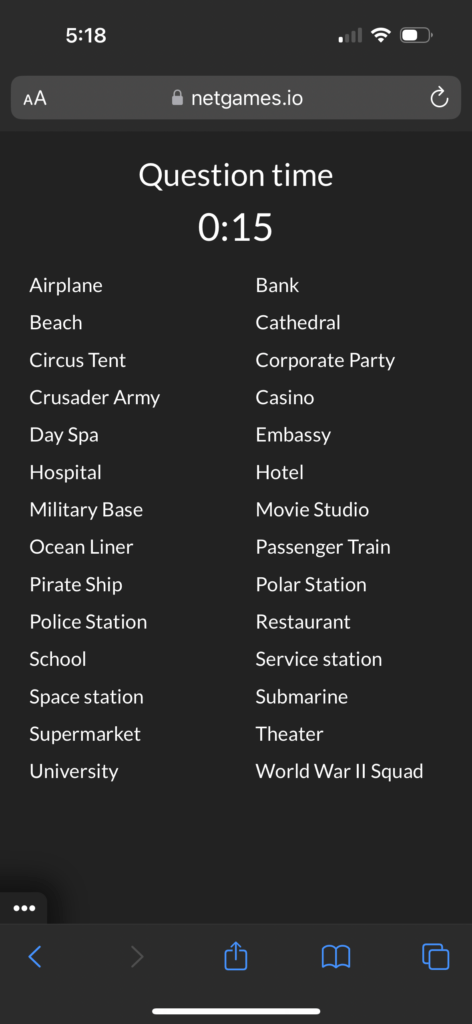For this critical play, I played Spyfall, designed by Alexandr Ushan and published by Hobby World. Played in a group of at least 3, the goal of the game is to figure out who the spy is. All players except for the spy can see which location they’re in from the provided location list, and the spy has to figure out which location it is. The game seems to have a pretty open target audience, since it’s kid-friendly and suitable for all ages. After playing the game, I noticed that the key mechanics in the game are the timed, turn-based questioning and the provided list of locations. These mechanics emphasize social deduction by allowing for player-freedom with the questioning itself while also constraining the questions in a way that doesn’t make the identity of the spy nor the location too obvious, which enhances the need for ramping question complexity and social interaction in order to deduce a player’s role.
One mechanic of Spyfall that makes it unique from similar games like Mafia or Among Us is the turn-based style of questioning. Furthermore, on a player’s turn, they can choose to ask their question to one specific person in the group (likely the one that they suspect to be the spy). This style of questioning enhances the social deduction aspect of the game because it forces a player to think carefully when it comes to choosing both their question and who to ask the question to. If they aren’t careful about deducing who they think is likely to be the spy, then they could end up wasting their turn or further confusing the group. In addition, this also forces the spy to be careful about how they formulate their own question, so they don’t make it too obvious that they don’t know what the location is. Since there’s also a time limit for the questioning, players are forced to make these deductions quickly and strategize the most efficient ways to figure out the spy/location. Another mechanic that further enhances the social deduction aspect of the game is the provided list of questions (pictured left), which serve to make the deduction process more complex. Although having a list of locations narrows the scope for the spy, it actually provides a challenge in its own way because several of the locations could be conflated. For instance, if a player asks “Is this place near water?”, this could be anything out of the Beach, Ocean Liner, Pirate Ship, Submarine, Restaurant, or more. This additional challenge forces players to be clever with their questions without revealing too much about the specific location, while also forcing the spy to read between the lines and aggregate bits of information across all the questions to deduce the exact location.
I think that this balancing of user-freedom with layers of challenge are a clever way to enhance the social deduction aspect of the game. However, I also wonder whether the turn-based system could be modified to make the game even more engaging. With similar games like Among Us or Mafia for instance, having an open-forum style of discussion can often be highly interactive, especially when arguments or back-and-forth dialogue occur. Incorporating some of this aspect could be beneficial to Spyfall — for instance, there were times when I felt like I had a great follow up question to another player’s question, but since I had to wait for my turn I think the momentum of building off another player’s dialogue can tend to fizzle out. Maybe having some sort of way to switch turns with a player or ‘turn steal’ could increase the ability for players to build upon the questions and dialogue of each other.
The mechanics of Spyfall in particular made me think back to the formal elements of design, because Spyfall actually doesn’t require many elements at all; the main formal elements are the players, rules, and objectives, all of which are quite simple. But the simplicity of the formal elements is fitting, because it actually seems to heighten the emphasis on the social deduction aspect. There aren’t many visual elements or over-complicated procedures, which places the focus on the players themselves and how they carry out the objectives and rules of the game. In a related game like Among Us, for instance, where there are many more visual and formal elements like movement, sub-objectives, action mechanics, and pathing, our focus as players usually isn’t only on the social deduction but also on all of these other aspects that demand our attention. With this in mind, Spyfall is quite successful as a social deduction game in the sense that it simplifies the game down to the core components necessary for social deduction.





